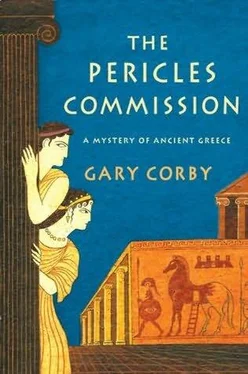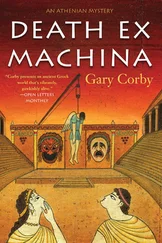Callias, the richest man in Athens, made his money from a rent-a-slave business, supplying slaves (short-lived ones) to the state-run silver mines. He was a fervent democrat who fought in the line at Marathon, and also a diplomat par excellence. The most surprising thing about Callias, to me, is that despite his qualities and unlike most of his peers, he did not try to become leader of Athens. Callias was a friend and supporter of Pericles, and yet also the brother-in-law of the arch-conservative Cimon, Pericles’ greatest enemy. He probably exerted a stabilizing influence.
Conspicuously offstage in The Pericles Commission are two men of vast importance: Cimon and Themistocles. Both had been ostracized-which means exiled for a period of ten years-before the book opens. Themistocles was the deep strategist whose battle plan saved the Greeks during the Persian invasion, but who later was accused of treason. He departed about nine years before the book opens. Cimon was ostracized mere months before the rise of the democracy. It was his departure that made it possible for Ephialtes to make his move.
So Nicolaos has survived his first taste of investigation, and he’s foiled one plot, but Athens’ position in the world is very far from safe. The city is caught in a cold war with the vast super-state of the Persian Empire. The Persians may have been beaten twenty years ago, but they haven’t given up.
Athens has perhaps thirty thousand men to serve in the army. Their enemy is the largest empire the world has yet seen, covering all of what today we would call the Middle East, plus Iraq, Syria, Iran, and Turkey, plus the Arabic Peninsula and Egypt. It’s not exactly even odds.
At the same time the league of Greek city-states that united against the Persians is collapsing. The cities bordering the Persian Empire desperately need Athens to remain strong; they know they’ll be swallowed up if Athens weakens. But on the other side of Greece the powerful city-states fear the astonishing and ever-growing influence of the democracy. Corinth is in a vicious trade war with Athens, which will lead to open fighting at any moment. Sparta, an insular, ruthlessly militaristic state in which every citizen is required to be a professional soldier, distrusts the clever Athenians and fears the democracy will spread across Hellas and incite rebellion.
In the coming years Athens will be on the knife edge of disaster, and if they fail now, our future goes with them. They need a breathing space. Fifty years will do. In that time they can invent almost everything that’s important to our civilization. But it can only happen if Athens doesn’t fall, and with the Persians to the east, and Sparta and Corinth to the west, the world’s first democracy is like a deer caught between two wolves.
Nico has his work cut out for him.
In the next book Nico will step inside the Persian Empire to meet Themistocles, who has defected to the enemy. A secret awaits him there, and he’d better be ready to deal with it, because he’ll be inside enemy territory with no one to help him. No one, that is, except a priestess from Mantinea.












